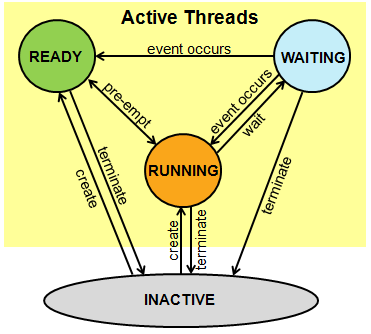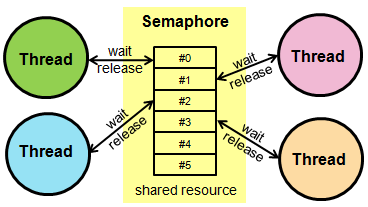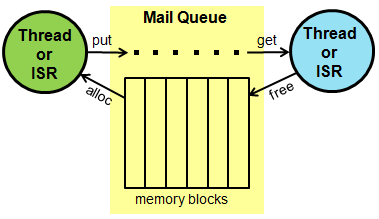You are viewing an older revision! See the latest version
RTOS
RTOS
- mbed RTOS
- CMSIS RTOS
The mbed RTOS API is a simple C++ encapsulation of the CMSIS RTOS C API.
Import librarymbed-rtos
Official mbed Real Time Operating System based on the RTX implementation of the CMSIS-RTOS API open standard.
Thread¶
The Thread class allows defining, creating, and controlling thread functions in the system. The function main is a special thread function that is started at system initialization and has the initial priority osPriorityNormal.
Import program
00001 #include "mbed.h" 00002 #include "rtos.h" 00003 00004 DigitalOut led1(LED1); 00005 DigitalOut led2(LED2); 00006 Thread thread; 00007 00008 void led2_thread() { 00009 while (true) { 00010 led2 = !led2; 00011 Thread::wait(1000); 00012 } 00013 } 00014 00015 int main() { 00016 thread.start(led2_thread); 00017 00018 while (true) { 00019 led1 = !led1; 00020 Thread::wait(500); 00021 } 00022 }
main
The main function is already the first thread scheduled by the rtos.
[Repository '/users/mbed_official/code/rtos/docs/tip/classrtos_1_1Thread.html' not found]
A Thread can be in the following states:
- RUNNING: The thread that is currently running is in the RUNNING state. Only one thread at a time can be in this state.
- READY: Threads which are ready to run are in the READY state. Once the RUNNING thread has terminated or is WAITING the next READY thread with the highest priority becomes the RUNNING thread.
- WAITING: Threads that are waiting for an event to occur are in the WAITING state.
- INACTIVE: Threads that are not created or terminated are in the INACTIVE state. These threads typically consume no system resources.

Mutex¶
A Mutex is used to synchronize the execution of threads: for example to protect the access to a shared resource.
ISR
The Mutex methods cannot be called from interrupt service routines (ISR).

Import program
00001 #include "mbed.h" 00002 #include "rtos.h" 00003 00004 Mutex stdio_mutex; 00005 00006 void notify(const char* name, int state) { 00007 stdio_mutex.lock(); 00008 printf("%s: %d\n\r", name, state); 00009 stdio_mutex.unlock(); 00010 } 00011 00012 void test_thread(void const *args) { 00013 while (true) { 00014 notify((const char*)args, 0); Thread::wait(1000); 00015 notify((const char*)args, 1); Thread::wait(1000); 00016 } 00017 } 00018 00019 int main() { 00020 Thread t2; 00021 Thread t3; 00022 00023 t2.start(callback(test_thread, (void *)"Th 2")); 00024 t3.start(callback(test_thread, (void *)"Th 3")); 00025 00026 test_thread((void *)"Th 1"); 00027 }
C standard library mutexes
The ARM C standard library has already mutexes in place to protect the access to stdio, therefore on the M3 mbed the above example is not necessary. On the contrary, ARM microlib (used on the M0 mbed) does not provide default stdio mutexes making the above example a necessity.
printf, malloc & new in ISR
Because of the mutexes in the ARM C standard library you can not use printf, malloc and new in ISR!
[Repository '/users/mbed_official/code/rtos/docs/tip/classrtos_1_1Mutex.html' not found]
Semaphore¶
A Semaphore is particularly useful to manage thread access to a pool of shared resources of a certain type.

Import program
00001 #include "mbed.h" 00002 #include "rtos.h" 00003 00004 Semaphore two_slots(2); 00005 00006 void test_thread(void const *name) { 00007 while (true) { 00008 two_slots.wait(); 00009 printf("%s\n\r", (const char*)name); 00010 Thread::wait(1000); 00011 two_slots.release(); 00012 } 00013 } 00014 00015 int main (void) { 00016 Thread t2; 00017 Thread t3; 00018 00019 t2.start(callback(test_thread, (void *)"Th 2")); 00020 t3.start(callback(test_thread, (void *)"Th 3")); 00021 00022 test_thread((void *)"Th 1"); 00023 }
[Repository '/users/mbed_official/code/rtos/docs/tip/classrtos_1_1Semaphore.html' not found]
Signals¶
Each Thread can be notified and wait for signals:
Import program
00001 #include "mbed.h" 00002 #include "rtos.h" 00003 00004 DigitalOut led(LED1); 00005 00006 void led_thread() { 00007 while (true) { 00008 // Signal flags that are reported as event are automatically cleared. 00009 Thread::signal_wait(0x1); 00010 led = !led; 00011 } 00012 } 00013 00014 int main (void) { 00015 Thread thread; 00016 00017 thread.start(callback(led_thread)); 00018 00019 while (true) { 00020 Thread::wait(1000); 00021 thread.signal_set(0x1); 00022 } 00023 }
Queue¶
A Queue allows you to queue pointers to data from producers threads to consumers threads:

Queue<message_t, 16> queue;
message_t *message;
queue.put(message);
osEvent evt = queue.get();
if (evt.status == osEventMessage) {
message_t *message = (message_t*)evt.value.p;
Import programrtos_queue
Basic example showing the Queue and MemoryPool API
[Repository '/users/mbed_official/code/rtos/docs/tip/classrtos_1_1Queue.html' not found]
MemoryPool¶
The MemoryPool class is used to define and manage fixed-size memory pools:
MemoryPool<message_t, 16> mpool; message_t *message = mpool.alloc(); mpool.free(message);
Import program
00001 #include "mbed.h" 00002 #include "rtos.h" 00003 00004 typedef struct { 00005 float voltage; /* AD result of measured voltage */ 00006 float current; /* AD result of measured current */ 00007 uint32_t counter; /* A counter value */ 00008 } message_t; 00009 00010 MemoryPool<message_t, 16> mpool; 00011 Queue<message_t, 16> queue; 00012 00013 /* Send Thread */ 00014 void send_thread (void) { 00015 uint32_t i = 0; 00016 while (true) { 00017 i++; // fake data update 00018 message_t *message = mpool.alloc(); 00019 message->voltage = (i * 0.1) * 33; 00020 message->current = (i * 0.1) * 11; 00021 message->counter = i; 00022 queue.put(message); 00023 Thread::wait(1000); 00024 } 00025 } 00026 00027 int main (void) { 00028 Thread thread; 00029 thread.start(callback(send_thread)); 00030 00031 while (true) { 00032 osEvent evt = queue.get(); 00033 if (evt.status == osEventMessage) { 00034 message_t *message = (message_t*)evt.value.p; 00035 printf("\nVoltage: %.2f V\n\r" , message->voltage); 00036 printf("Current: %.2f A\n\r" , message->current); 00037 printf("Number of cycles: %u\n\r", message->counter); 00038 00039 mpool.free(message); 00040 } 00041 } 00042 }
[Repository '/users/mbed_official/code/rtos/docs/tip/classrtos_1_1MemoryPool.html' not found]
Mail¶
A Mail works like a queue with the added benefit of providing a memory pool for allocating messages (not only pointers).

Import program
00001 #include "mbed.h" 00002 #include "rtos.h" 00003 00004 /* Mail */ 00005 typedef struct { 00006 float voltage; /* AD result of measured voltage */ 00007 float current; /* AD result of measured current */ 00008 uint32_t counter; /* A counter value */ 00009 } mail_t; 00010 00011 Mail<mail_t, 16> mail_box; 00012 00013 void send_thread (void) { 00014 uint32_t i = 0; 00015 while (true) { 00016 i++; // fake data update 00017 mail_t *mail = mail_box.alloc(); 00018 mail->voltage = (i * 0.1) * 33; 00019 mail->current = (i * 0.1) * 11; 00020 mail->counter = i; 00021 mail_box.put(mail); 00022 Thread::wait(1000); 00023 } 00024 } 00025 00026 int main (void) { 00027 Thread thread; 00028 thread.start(callback(send_thread)); 00029 00030 while (true) { 00031 osEvent evt = mail_box.get(); 00032 if (evt.status == osEventMail) { 00033 mail_t *mail = (mail_t*)evt.value.p; 00034 printf("\nVoltage: %.2f V\n\r" , mail->voltage); 00035 printf("Current: %.2f A\n\r" , mail->current); 00036 printf("Number of cycles: %u\n\r", mail->counter); 00037 00038 mail_box.free(mail); 00039 } 00040 } 00041 }
[Repository '/users/mbed_official/code/rtos/docs/tip/classrtos_1_1Mail.html' not found]
RTOS Timer¶
The RtosTimer class allows creating and and controlling of timer functions in the system. A timer function is called when a time period expires whereby both on-shot and periodic timers are possible. A timer can be started, restarted, or stopped. Timers are handled in the thread osTimerThread. Callback functions run under control of this thread and may use CMSIS-RTOS API calls.

[Not converted]
[Not converted]
Interrupt Service Routines¶
The same RTOS API can be used in ISR. The only two warnings are:
Mutexcan not be used.- Wait in ISR is not allowed: all the timeouts in method parameters have to be set to 0 (no wait).
[Not converted]
Default Timeouts¶
The mbed rtos API has made the choice of defaulting to 0 timeout (no wait) for the producer methods, and osWaitForever (infinitive wait) for the consumer methods.
A typical scenario for a producer could be a peripheral triggering an interrupt to notify an event: in the corresponding interrupt service routine you cannot wait (this would deadlock the entire system). On the other side, the consumer could be a background thread waiting for events: in this case the desired default behaviour is not using CPU cycles until this event is produced, hence the osWaitForever.
No wait in ISR
When calling an rtos object method in an ISR all the timeout parameters have to be set to 0 (no wait): waiting in ISR is not allowed.
Status and Error Codes¶
The Status and Error Codes section lists all the return values that the CMSIS-RTOS functions will return:
osOK: function completed; no event occurred.osEventSignal: function completed; signal event occurred.osEventMessage: function completed; message event occurred.osEventMail: function completed; mail event occurred.osEventTimeout: function completed; timeout occurred.osErrorParameter: parameter error: a mandatory parameter was missing or specified an incorrect object.osErrorResource: resource not available: a specified resource was not available.osErrorTimeoutResource: resource not available within given time: a specified resource was not available within the timeout period.osErrorISR: not allowed in ISR context: the function cannot be called from interrupt service routines.osErrorISRRecursive: function called multiple times from ISR with same object.osErrorPriority: system cannot determine priority or thread has illegal priority.osErrorNoMemory: system is out of memory: it was impossible to allocate or reserve memory for the operation.osErrorValue: value of a parameter is out of range.osErrorOS: unspecified RTOS error: run-time error but no other error message fits.
osEvent¶
The osEvent data structure is returned by get methods of Queue and Mail objects.
This data structure contains both an error code and a pointer to the actual data:
[Not converted]
